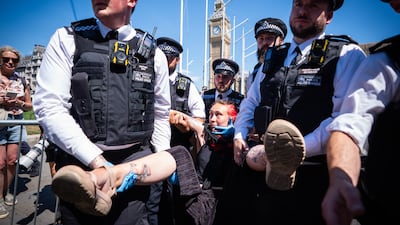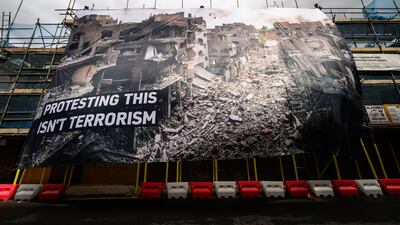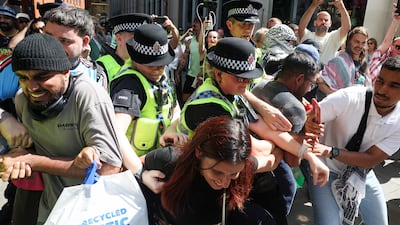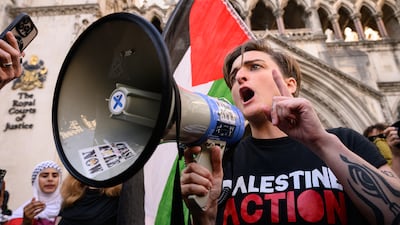None of the 200 demonstrators arrested in the UK for supporting Palestine Action in recent weeks have been charged, campaigners have claimed, as they sought support for a protest on Saturday.
The direct action protest group was designated a terrorist organisation in July after it claimed to be behind millions of pounds worth of damage at a Royal Air Force base. The High Court has agreed to review the decision in November.
Until then, the ban means that membership of, or support for, Palestine Action is a criminal offence punishable by up to 14 years in prison, under the Terrorism Act 2000.
But Tim Crosland, a spokesman for the campaign group Defend Our Juries, said the group believes potential legal claims against police should proscription be deemed unlawful lay behind the lack of prosecutions.
“Nobody has been charged. It's important to say, and there's a sense that there aren't going to be any charges till the other side of the judicial review,” Mr Crosland said at a press briefing on Wednesday.
More than 500 people have committed to holding a sign saying “I Support Palestine Action” in Central London on Saturday, he said.
Mr Crosland, who is organising the protest alongside Palestine Action’s co-founder Huda Ammori, said they had received advice from solicitors that those arrested would be able to make legal claims against the police for “unlawful arrest” if the proscription order is eventually struck down.
“We've specifically asked them: if the order is struck down in November, does that open up the possibility for legal claims against the police for unlawful arrest and for trespass to people's property? And the answer to that was yes,” Mr Crosland said.
Ms Ammori said she was hopeful the decision would be overturned by then, but acknowledged there was a “substantial risk” in showing support for the group. “Obviously there is a substantial risk, but you know, we do hope to be successful in this legal challenge,” she said.
The British activist, of Palestinian and Iraqi heritage, sought an injunction to delay the proscription in early July, which was denied by the High Court. Last week, she was granted her bid to challenge the ban, though the terrorism designation will remain in place until then.
Further demonstrations are being planned for the coming months until the High Court ruling.
“If arresting and prosecuting more than 500 people is an absurd waste of public resources, that's not on us. We're not the ones who made this law. We're not the ones doing the arresting. We will keep going as long as people keep wanting to take part in this action,” Mr Crosland said.
The proscription has caused outcry, particularly from veteran campaigners who say that direct action has a long history in British politics, going all the way back to the Suffragettes.
Among those arrested was 83-year-old priest Sue Parfitt and an 81-year-old former magistrate.
Angie Zelter, a veteran peace protestor, said there was visible “discomfort” among the police making arrests at demonstrations supporting Palestine Action.
“There's a lot of discomfort amongst the police, because they are making a mockery of the definition of terrorism,” she said, adding that she plans to attend the demonstration on Saturday.
Discussing the arrests, Mr Crosland said that in Derry, Edinburgh, Kendal and Chichester, police did not act. "It shows they can exercise common sense if they want to," he said.
"In London, people have been arrested under Section 13 of the Terrorism Act, which is the lesser of the two possible charges, and somewhere between six and 12 hours after a police interview in the police cells, people have been arrested without charge.
"In Cardiff, people were arrested under Section 12, which is an offence punishable with 14 years' imprisonment - doing exactly the same thing, holding the same sign, quietly sitting - they were held in police custody beyond the 24-hour maximum. The time was extended under the terrorism laws while those people's houses were raided."
The Metropolitan Police have been contacted by The National over the claims it is holding back on bringing charges.
However, it has warned it would arrest demonstrators on Saturday and suggested that they were attempting to put the UK's overcrowded criminal justice system under further pressure.
“We are aware that the organisers of Saturday’s planned protest are encouraging hundreds of people to turn out with the intention of placing a strain on the police and the wider criminal justice system,” a representative of the force said.
“The Met is very experienced in dealing with large-scale protests, including where the protest activity crosses into criminality requiring arrests. Our officers will continue to apply the law in relation to Palestine Action as we have done since its proscription. Anyone showing support for the group can expect to be arrested.”
The move to ban Palestine Action came after two Voyager aircraft were damaged at RAF Brize Norton in Oxfordshire on June 20, which police said caused about £7 million worth of damage.
Home Secretary Yvette Cooper announced plans to proscribe Palestine Action three days later, saying the vandalism of the planes was "disgraceful" and the group had a "long history of unacceptable criminal damage".
Know your Camel lingo
The bairaq is a competition for the best herd of 50 camels, named for the banner its winner takes home
Namoos - a word of congratulations reserved for falconry competitions, camel races and camel pageants. It best translates as 'the pride of victory' - and for competitors, it is priceless
Asayel camels - sleek, short-haired hound-like racers
Majahim - chocolate-brown camels that can grow to weigh two tonnes. They were only valued for milk until camel pageantry took off in the 1990s
Millions Street - the thoroughfare where camels are led and where white 4x4s throng throughout the festival
Groom and Two Brides
Director: Elie Semaan
Starring: Abdullah Boushehri, Laila Abdallah, Lulwa Almulla
Rating: 3/5
Superpower%20
%3Cp%3E%3Cstrong%3EDirector%3A%20%3C%2Fstrong%3ESean%20Penn%2C%20Aaron%20Kaufman%3C%2Fp%3E%0A%3Cp%3E%3Cstrong%3ERating%3A%20%3C%2Fstrong%3E3%2F5%3C%2Fp%3E%0A
The National's picks
4.35pm: Tilal Al Khalediah
5.10pm: Continous
5.45pm: Raging Torrent
6.20pm: West Acre
7pm: Flood Zone
7.40pm: Straight No Chaser
8.15pm: Romantic Warrior
8.50pm: Calandogan
9.30pm: Forever Young
Ten10 Cricket League
Venue and schedule Sharjah Cricket Stadium, December 14 to 17
Teams
Maratha Arabians Leading player: Virender Sehwag; Top picks: Mohammed Amir, Imad Wasim; UAE players: Shaiman Anwar, Zahoor Khan
Bengal Lions Leading player: Sarfraz Ahmed; Top picks: Sunil Narine, Mustafizur Rahman; UAE players: Mohammed Naveed, Rameez Shahzad
Kerala Kings Leading player: Eoin Morgan; Top picks: Kieron Pollard, Sohail Tanvir; UAE players: Rohan Mustafa, Imran Haider
Pakhtoons Leading player: Shahid Afridi; Top picks: Fakhar Zaman, Tamim Iqbal; UAE players: Amjad Javed, Saqlain Haider
Punjabi Legends Leading player: Shoaib Malik; Top picks: Hasan Ali, Chris Jordan; UAE players: Ghulam Shabber, Shareef Asadullah
Team Sri Lanka Cricket Will be made up of Colombo players who won island’s domestic limited-overs competition
White hydrogen: Naturally occurring hydrogen
Chromite: Hard, metallic mineral containing iron oxide and chromium oxide
Ultramafic rocks: Dark-coloured rocks rich in magnesium or iron with very low silica content
Ophiolite: A section of the earth’s crust, which is oceanic in nature that has since been uplifted and exposed on land
Olivine: A commonly occurring magnesium iron silicate mineral that derives its name for its olive-green yellow-green colour
More from Rashmee Roshan Lall
The five pillars of Islam
What are the GCSE grade equivalents?
- Grade 9 = above an A*
- Grade 8 = between grades A* and A
- Grade 7 = grade A
- Grade 6 = just above a grade B
- Grade 5 = between grades B and C
- Grade 4 = grade C
- Grade 3 = between grades D and E
- Grade 2 = between grades E and F
- Grade 1 = between grades F and G
The specs
AT4 Ultimate, as tested
Engine: 6.2-litre V8
Power: 420hp
Torque: 623Nm
Transmission: 10-speed automatic
Price: From Dh330,800 (Elevation: Dh236,400; AT4: Dh286,800; Denali: Dh345,800)
On sale: Now
Learn more about Qasr Al Hosn
In 2013, The National's History Project went beyond the walls to see what life was like living in Abu Dhabi's fabled fort:
2025 Fifa Club World Cup groups
Group A: Palmeiras, Porto, Al Ahly, Inter Miami.
Group B: Paris Saint-Germain, Atletico Madrid, Botafogo, Seattle.
Group C: Bayern Munich, Auckland City, Boca Juniors, Benfica.
Group D: Flamengo, ES Tunis, Chelsea, Leon.
Group E: River Plate, Urawa, Monterrey, Inter Milan.
Group F: Fluminense, Borussia Dortmund, Ulsan, Mamelodi Sundowns.
Group G: Manchester City, Wydad, Al Ain, Juventus.
Group H: Real Madrid, Al Hilal, Pachuca, Salzburg.
Fixtures (all in UAE time)
Friday
Everton v Burnley 11pm
Saturday
Bournemouth v Tottenham Hotspur 3.30pm
West Ham United v Southampton 6pm
Wolves v Fulham 6pm
Cardiff City v Crystal Palace 8.30pm
Newcastle United v Liverpool 10.45pm
Sunday
Chelsea v Watford 5pm
Huddersfield v Manchester United 5pm
Arsenal v Brighton 7.30pm
Monday
Manchester City v Leicester City 11pm
UFC Fight Night 2
1am – Early prelims
2am – Prelims
4am-7am – Main card
7:30am-9am – press cons
MATCH INFO
Uefa Champions League semi-final, second leg result:
Ajax 2-3 Tottenham
Tottenham advance on away goals rule after tie ends 3-3 on aggregate
Final: June 1, Madrid
FIVE%20TRENDS%20THAT%20WILL%20SHAPE%20UAE%20BANKING
%3Cp%3E%E2%80%A2%20The%20digitisation%20of%20financial%20services%20will%20continue%3C%2Fp%3E%0A%3Cp%3E%E2%80%A2%20Managing%20and%20using%20data%20effectively%20will%20become%20a%20competitive%20advantage%3C%2Fp%3E%0A%3Cp%3E%E2%80%A2%20Digitisation%20will%20require%20continued%20adjustment%20of%20operating%20models%3C%2Fp%3E%0A%3Cp%3E%E2%80%A2%20Banks%20will%20expand%20their%20role%20in%20the%20customer%20life%20through%20ecosystems%3C%2Fp%3E%0A%3Cp%3E%E2%80%A2%20The%20structure%20of%20the%20sector%20will%20change%3C%2Fp%3E%0A
UAE currency: the story behind the money in your pockets
Electric scooters: some rules to remember
- Riders must be 14-years-old or over
- Wear a protective helmet
- Park the electric scooter in designated parking lots (if any)
- Do not leave electric scooter in locations that obstruct traffic or pedestrians
- Solo riders only, no passengers allowed
- Do not drive outside designated lanes
EXPATS
%3Cp%3E%3Cstrong%3EDirector%3A%3C%2Fstrong%3E%20Lulu%20Wang%26nbsp%3B%3C%2Fp%3E%0A%3Cp%3E%3Cstrong%3EStars%3A%3C%2Fstrong%3E%20Nicole%20Kidman%2C%20Sarayu%20Blue%2C%20Ji-young%20Yoo%2C%20Brian%20Tee%2C%20Jack%20Huston%3C%2Fp%3E%0A%3Cp%3E%3Cstrong%3ERating%3A%3C%2Fstrong%3E%204%2F5%3C%2Fp%3E%0A
UPI facts
More than 2.2 million Indian tourists arrived in UAE in 2023
More than 3.5 million Indians reside in UAE
Indian tourists can make purchases in UAE using rupee accounts in India through QR-code-based UPI real-time payment systems
Indian residents in UAE can use their non-resident NRO and NRE accounts held in Indian banks linked to a UAE mobile number for UPI transactions
Stage results
1. Julian Alaphilippe (FRA) Deceuninck-QuickStep 4:39:05
2. Michael Matthews (AUS) Team BikeExchange 0:00:08
3. Primoz Roglic (SLV) Jumbo-Visma same time
4. Jack Haig (AUS) Bahrain Victorious s.t
5. Wilco Kelderman (NED) Bora-Hansgrohe s.t
6. Tadej Pogacar (SLV) UAE Team Emirates s.t
7. David Gaudu (FRA) Groupama-FDJ s.t
8. Sergio Higuita Garcia (COL) EF Education-Nippo s.t
9. Bauke Mollema (NED) Trek-Segafredo s.t
10. Geraint Thomas (GBR) Ineos Grenadiers s.t
Conflict, drought, famine
Estimates of the number of deaths caused by the famine range from 400,000 to 1 million, according to a document prepared for the UK House of Lords in 2024.
It has been claimed that the policies of the Ethiopian government, which took control after deposing Emperor Haile Selassie in a military-led revolution in 1974, contributed to the scale of the famine.
Dr Miriam Bradley, senior lecturer in humanitarian studies at the University of Manchester, has argued that, by the early 1980s, “several government policies combined to cause, rather than prevent, a famine which lasted from 1983 to 1985. Mengistu’s government imposed Stalinist-model agricultural policies involving forced collectivisation and villagisation [relocation of communities into planned villages].
The West became aware of the catastrophe through a series of BBC News reports by journalist Michael Buerk in October 1984 describing a “biblical famine” and containing graphic images of thousands of people, including children, facing starvation.
Band Aid
Bob Geldof, singer with the Irish rock group The Boomtown Rats, formed Band Aid in response to the horrific images shown in the news broadcasts.
With Midge Ure of the band Ultravox, he wrote the hit charity single Do They Know it’s Christmas in December 1984, featuring a string of high-profile musicians.
Following the single’s success, the idea to stage a rock concert evolved.
Live Aid was a series of simultaneous concerts that took place at Wembley Stadium in London, John F Kennedy Stadium in Philadelphia, the US, and at various other venues across the world.
The combined event was broadcast to an estimated worldwide audience of 1.5 billion.
The years Ramadan fell in May
Mental%20health%20support%20in%20the%20UAE
%3Cp%3E%E2%97%8F%20Estijaba%20helpline%3A%208001717%3Cbr%3E%E2%97%8F%20UAE%20Ministry%20of%20Health%20and%20Prevention%20hotline%3A%20045192519%3Cbr%3E%E2%97%8F%20UAE%20Mental%20health%20support%20line%3A%20800%204673%20(Hope)%3Cbr%3EMore%20information%20at%20hope.hw.gov.ae%3C%2Fp%3E%0A











